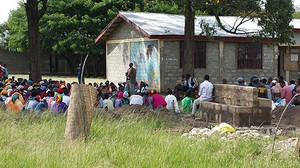Applying social accountability principles helps government officials and community representatives to respect the wider community. It encourages government officials to take the community into consideration when making decisions and this should improve the delivery of urban WASH services in the long term.
As a WASH practitioner and development worker you should understand the general approaches to achieving social accountability so that you can encourage and support these practices to be applied in your particular locality. Common approaches to putting social accountability into practice include the following methods:
- Producing clear, relevant information in a simple and understandable way. If such information is made public and is easily accessible, this can raise public awareness and help promote mobilisation of resources at a local level.
- Creating opportunities for communities to meet, discuss and present their views to the decision makers and power holders. Listening to community needs, opinions and concerns is an important part of social accountability. If there are good communications between a community and the government, this can help the government to understand the local context, including community priorities and concerns, and therefore enhance the performance of the public service. It is also empowering for the community because their voices are heard and they gain experience of participating in decision making.
- Negotiating about possible changes and new services. This can be achieved by direct and regular interactions between government officials and members of the community. Such interactions could include community level meetings, mediated consultations and conversations between community and government officials (Figure 5.2).

Figure 5.2 A community meeting to discuss provision of WASH services in Hawassa.
It’s important for information and communication to reach all members of the community. Effective social accountability needs to have active engagement of everyone, including less powerful stakeholders, poor people and disadvantaged community groups such as women, youth and minority groups. This can improve equity and strengthen social accountability.
Four key areas for implementing social accountability mechanisms were listed in Section 5.1. Putting the principles into practice in these areas means the following:
- Participation in planning and development: This can be achieved by sharing information and communicating effectively by such methods as local radio, public hearings, public announcements (Figure 5.3) and community meetings and discussions.
- Participatory budget setting: By involving community members in formulating and prioritising budgets for urban WASH projects.
- Participation in expenditure tracking: This involves citizen groups or community members monitoring the manner in which the government spends public funds.
- Participatory performance monitoring: This involves keeping track of and evaluating the impacts of government projects on intended beneficiaries. It includes assessing the efficiency, quality and responsiveness of public service delivery using participatory performance monitoring tools such as community score cards and citizen report cards (see Box 5.1).

Figure 5.3 Using a loud hailer to make announcements can help to spread the message.
You will see that all four of the methods for implementing social accountability mechanisms include the word ‘participatory’ or ‘participation’. What does this mean in practical terms?
Show answer
This means that community participation is essential in order for any of the methods to be successful.
Box 5.1 Citizen report cards and community score cards
Citizen report cards are a type of survey tool used to get feedback from users about the performance of public services (World Bank, 2004). They consist of questionnaires that are used to collect data from large numbers of households or individuals. The collected data is analysed and written up in a report that is published and can be discussed at public meetings.
Community score cards (CSCs) are another participatory tool for evaluating public services. CSCs are used at a smaller, more local scale than citizen report cards and focus on a specific community. Information is not gathered by questionnaire but through a focus group, A focus group is a selected group of people who are brought together to discuss an issue (Figure 5.4). The method includes a face-to-face meeting between the community and the service provider, which allows for immediate feedback on the quality of service provided (World Bank, 2005).

Figure 5.4 A focus group discussing a WASH project.
The effectiveness of implementing social accountability measures depends on the local context. Its success rate depends on:
- communication between the community and the service provider
- attitudes and capacities of citizens
- attitudes and capacities of government officials
- an enabling environment.
Implementing social accountability is challenging for government officers at all levels. The attitudes of both citizens and officials are important because they need to value the principles of accountability and be committed to putting them into practice. However, social accountability has many benefits. Promoting the principles of social accountability can contribute towards improved governance, enhanced public services and enabling local officials to make well-informed decisions. Social accountability can also facilitate multi-stakeholder communications and empower local communities, especially marginalised social groups.


